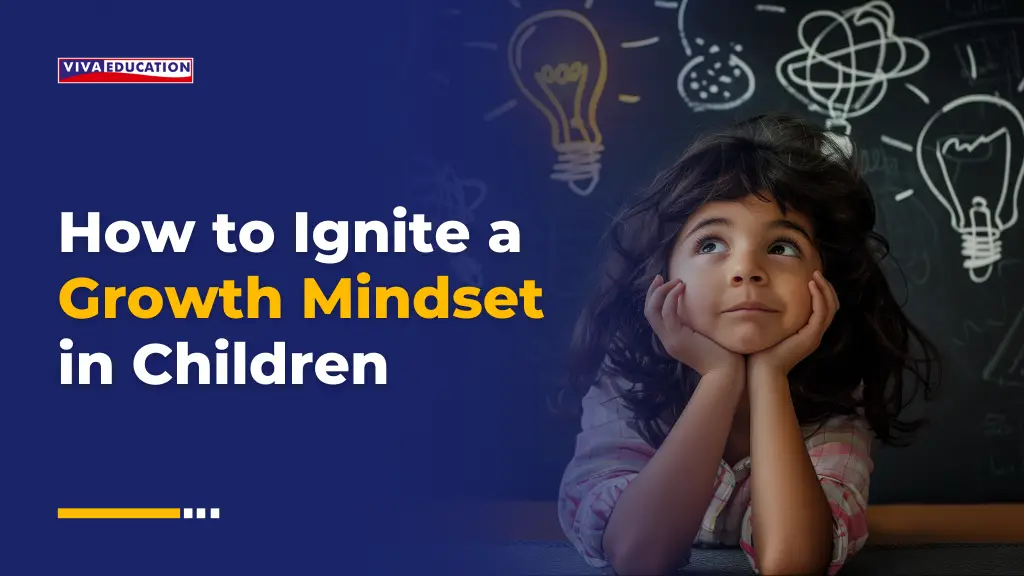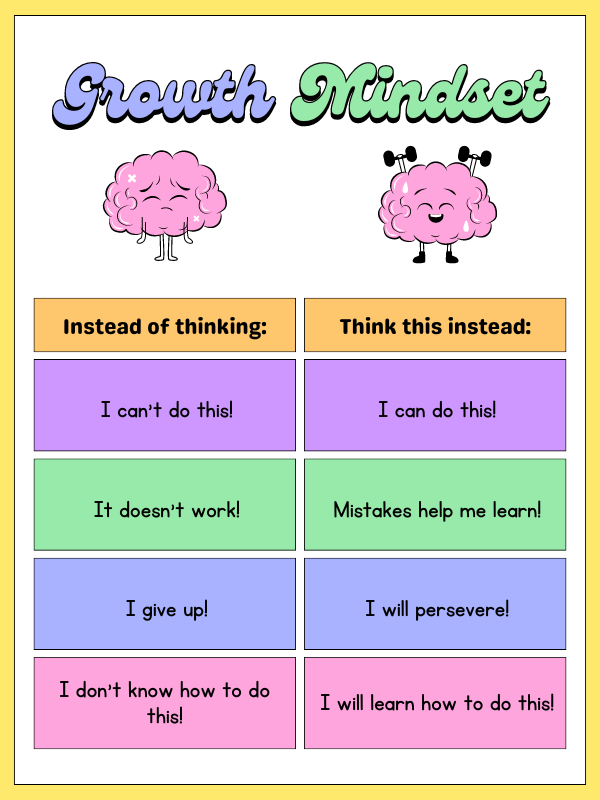How to Ignite a Growth Mindset in Children
- Parents
- September 13, 2024
- Viva Education

For most of the parents, it might be surprising to realize how their perspective on intelligence affects your child’s academic performance. Yes! Your attitude influences a child’s educational performance. Hence, it would help if you fostered a growth mindset in them.
Children with a growth mindset work on the fact that intelligence can be acquired. They are open about tackling challenging assignments since they know that work results in achievement.
Conversely, if your youngster has a fixed mindset, they view intelligence as set in stone. They are more prone to giving up and less likely to take chances when confronted with difficulty.
This blog will walk you through all aspects of a growth mindset, explain why it’s essential for your child’s development, and provide some practical home projects you might find encouraging.
What Does a Growth Mindset Signify?
Growth mindset is the belief that hard work and dedication will enable your child to develop knowledge, ability and skills. It emphasizes the significance of work with determination for kids to grow expertise and competence.
Consider the brain as a muscle. Working the brain makes one more intelligent. Youngsters with a growth mindset seek possibilities. Rather than “I can’t,” they say, “I can’t do this yet, but I’ll get there.” This style of thinking removes hurdles to education and personal growth.
Why Do Young Ones Need a Growth Mindset?
It helps define their ideas of success and failure. Your child with a progressive attitude can see failure as a stepping stone towards success rather than a setback. They will be able to understand that mistakes are unavoidable at times, and it’s only a sincere effort to learn from them that results in development.
Think of your youngster given a difficult arithmetic assignment. A growth attitude means approaching it with curiosity and resolve, convincing them that their efforts will pay off. This kind of thinking not only helps students excel academically but also develops resilience, enabling the students to negotiate the ups and downs of life.

How It Can Be a Game-changer for Your Kids
Here are some particular advantages for your child in cultivating a growth mindset.
- Developing the Skill of Learning
This skill will help your child to develop the ability to learn new skills. They will treat tough subjects as challenges to conquer rather than something to avoid. Outside the classroom, this curiosity and love of information motivate lifetime learning.
- Laying the Foundation for Better Academic Outcomes
A growth mindset improves cognitive flexibility—the capacity to solve problems and adapt to new circumstances. Children who feel they can improve their competency often perform better in the classroom since they are more driven to complete their assignments.
- Changing Attitudes Toward Challenges and Failure
Your child will welcome challenges and failure rather than running away from them. They will see failure as a teaching tool rather than a destination. This thinking enables people to overcome obstacles and persevere through trying circumstances.
- Contributing to Greater Outcomes in Life
Developing a growth mindset helps one get better outcomes in life than merely academic ones. It creates endurance, inventiveness and adaptability—qualities needed for success. When the youngsters with a growth mindset become adults, they don’t hesitate to pursue their aspirations, learn from their mistakes, and take measured chances.
- Developing Social Relationships
Your child’s growth mindset will help them interact socially. Understanding that skills can be acquired enables one to be more sympathetic and motivating to others, promoting teamwork, collaboration and cooperation.
- Encourages Perseverance
Your child is likely to carry on through difficulties if they have a growth mentality. They develop a strong work ethic when they discover that overcoming challenges depends mostly on effort and tenacity.
How to Encourage a Growth Mindset in Your Child
Communication is one of the most effective ways to help your child develop a growth mindset. Listed below are a few questions that can help you develop that mindset in your child.
1. What is your mind telling you? If your child says, “I can’t do this,” help them question that belief. They could say, “Okay, but I can try my best!” Positive self-talk fosters resilience and confidence.
2. What’s the tricky part? How can you overcome it? Guide your child in breaking down a complex task into manageable pieces. Sometimes, they may find a simple factor causing them trouble. If it is identified and addressed properly, the task would seem less daunting.
3. What challenges have you already overcome? Remind your child of past achievements. This reinforces the belief that they can tackle new challenges.
4. What did your mistakes teach you? Mistakes offer valuable learning opportunities. Discussing what went wrong and how it could be fixed helps your child see mistakes as a regular part of growth.
5. What was today’s challenge, and how did you overcome it? Get your child to reflect every day. It will help them recognize and embrace challenges. It will also helpful in developing problem-solving skills they can employ in the future.
6. What have you tried and what can you try next time? Instead of giving empty reassurances like “You’ll get it next time,” this question encourages your child to think of alternatives and form a plan to address the issue.
Wrapping Up
Building a growth mindset in your child will equip them for success in all spheres of life. Those who feel their skills can be developed with diligence and dedication can overcome obstacles with assurance and tenacity.
Positive conversations, words of encouragement and guidelines on modelling behaviour will help your youngster develop this attitude. Remember, the objective is not merely to raise intellectual children; it is as vital as raising youngsters who feel they can always become smarter.



